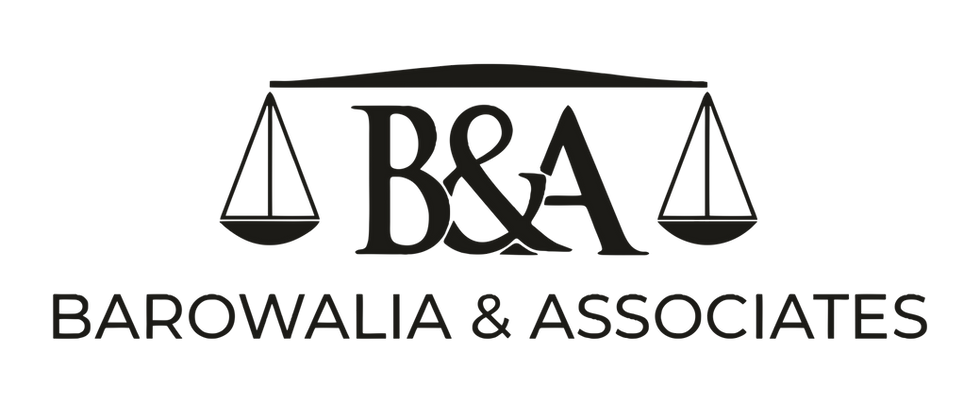How the Constitution Protects Your Fundamental Rights
- Barowalia & Associates
- Jun 12
- 3 min read
The Constitution of India is the supreme law of the land. It not only lays down how the government should function but also guarantees important rights to every citizen. These rights are called Fundamental Rights and they protect your freedom, dignity, and equality.
In this blog, we explain what Fundamental Rights are, why they matter, how the Constitution safeguards them, and what you can do if your rights are violated.
What Are Fundamental Rights?
Fundamental Rights are basic rights that the Constitution guarantees to every citizen of India. They are essential for living a free, fair, and dignified life. These rights cannot be taken away except under certain legal conditions.
They include rights like:
Right to Equality,
Right to Freedom of Speech and Expression,
Right to Life and Personal Liberty,
Right against Exploitation,
Right to Freedom of Religion,
Cultural and Educational Rights,
Right to Constitutional Remedies.
Why Are Fundamental Rights Important?
They protect individuals from unfair treatment by the government or others,
Ensure every person is treated equally and with respect,
Guarantee freedom to live, speak, worship, and work without fear,
Provide legal tools to fight injustice and discrimination,
Help build a just and democratic society.
How Does the Constitution Protect Fundamental Rights?
1. Direct Guarantee
The Constitution clearly states these rights in Part III (Articles 12 to 35). It says that all laws and government actions must respect these rights.
2. Enforcement Through Courts
If your fundamental rights are violated, you can go to the High Court or Supreme Court directly to seek justice.
Article 32 of the Constitution allows you to file a petition in the Supreme Court,
Article 226 allows you to file a petition in the High Court.
3. Writ Petitions
The courts can issue orders called writs to protect your rights. For example:
Habeas Corpus to release you if illegally detained,
Mandamus to order government officials to perform their duties,
Prohibition and Certiorari to stop illegal actions by authorities,
Quo Warranto to question unlawful holding of public office.
What Are Some Key Fundamental Rights?
Right to Equality (Articles 14-18)
Equal treatment before law,
No discrimination based on religion, caste, sex, or place of birth,
Abolition of untouchability and titles.
Right to Freedom (Articles 19-22)
Freedom of speech, expression, assembly, movement, and profession,
Protection against arrest without legal procedure,
Right to fair trial.
Right against Exploitation (Articles 23-24)
Prohibition of trafficking, forced labor, and child labor.
Right to Freedom of Religion (Articles 25-28)
Freedom to practice, profess, and propagate religion.
Cultural and Educational Rights (Articles 29-30)
Protection of minorities’ rights to preserve language and culture.
Right to Constitutional Remedies (Article 32)
The most important right that allows you to approach courts to protect all other rights.
What to Do If Your Fundamental Rights Are Violated?
Step 1: Know Your Rights
Understanding your rights helps you recognize violations and take action.
Step 2: File a Complaint or Representation
Approach the concerned authority or government department with a written complaint.
Step 3: Seek Legal Help
Consult a lawyer who specializes in constitutional law or human rights.
Step 4: File a Writ Petition or PIL
If necessary, approach the High Court or Supreme Court by filing a writ petition or public interest litigation (PIL).
Step 5: Follow Up
Stay involved in the legal process until the matter is resolved.
How Barowalia & Associates Can Help You
Explain your fundamental rights in simple terms,
Assess if your rights have been violated,
Guide you on the best legal remedies available,
Prepare and file writ petitions or PILs in High Court and Supreme Court,
Represent you in court and follow up until justice is done.
Conclusion
Fundamental Rights are your shield against injustice, discrimination, and oppression. The Constitution of India guarantees these rights and gives you the power to protect them through the courts. Always remember, knowing your rights is the first step to protecting them.
If you believe your fundamental rights are being violated in Himachal Pradesh or anywhere else in India, contact Barowalia & Associates for expert advice and strong legal support.
Please share this blog to help others understand their rights. For personalized legal assistance, feel free to reach out to us anytime!

Comments